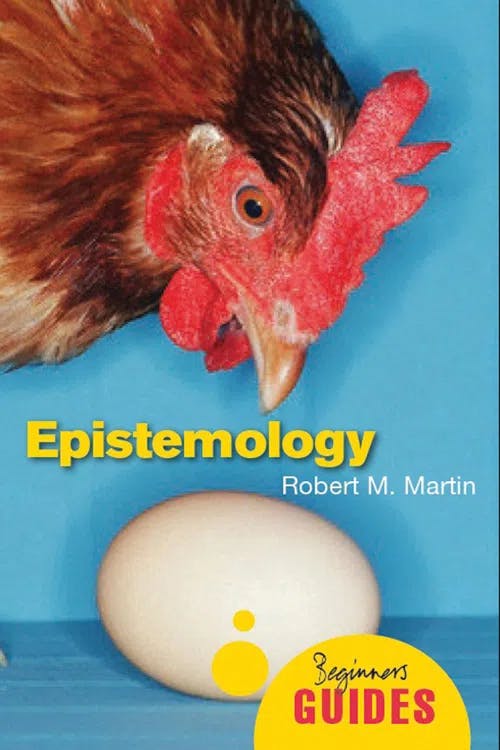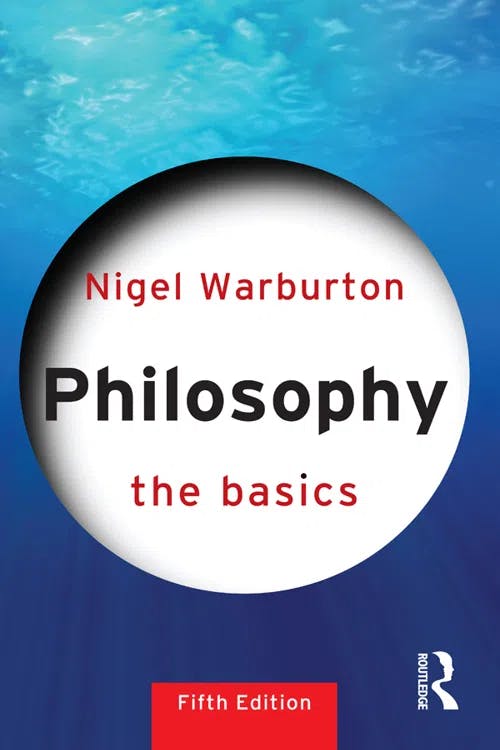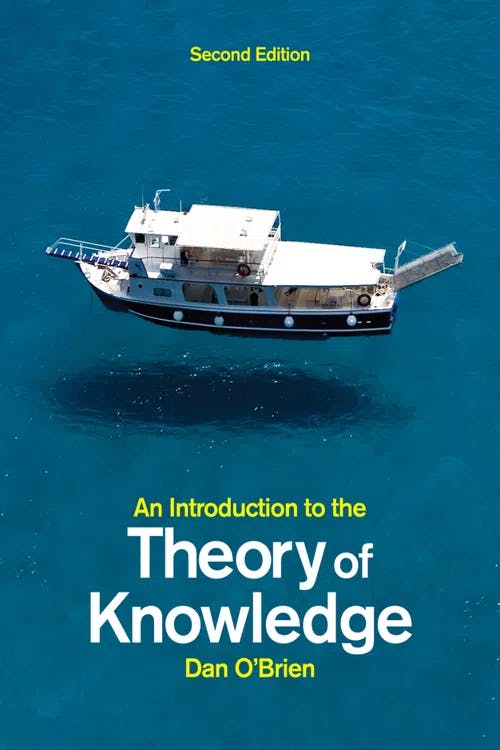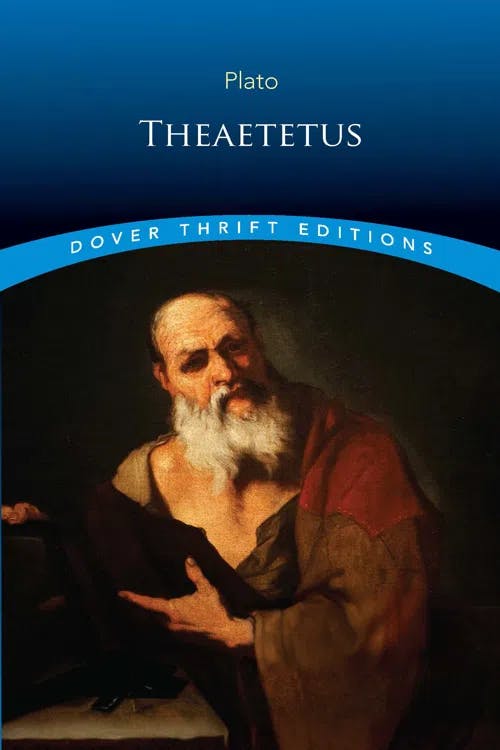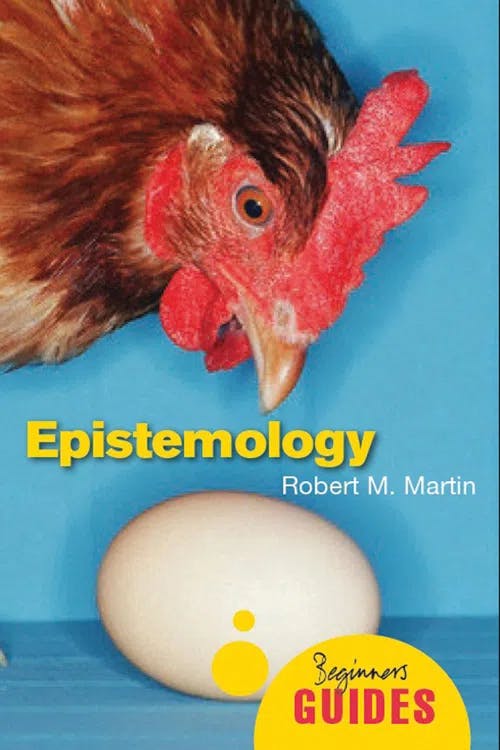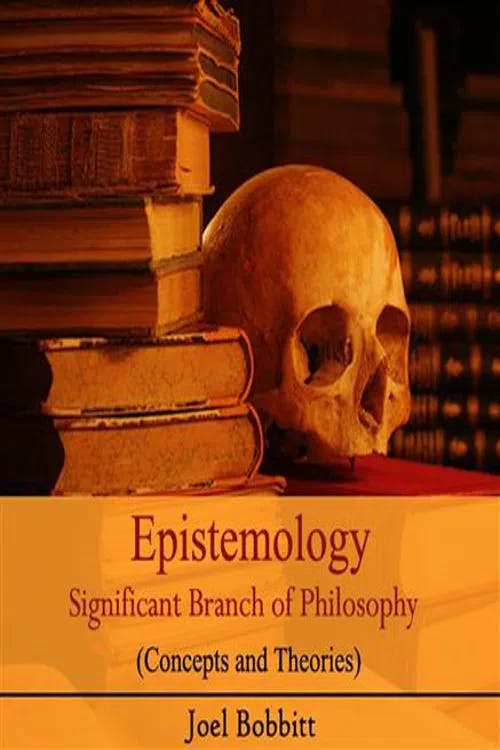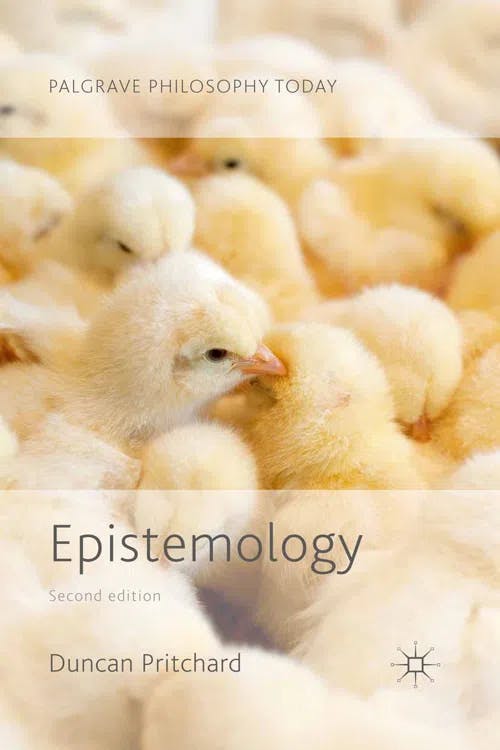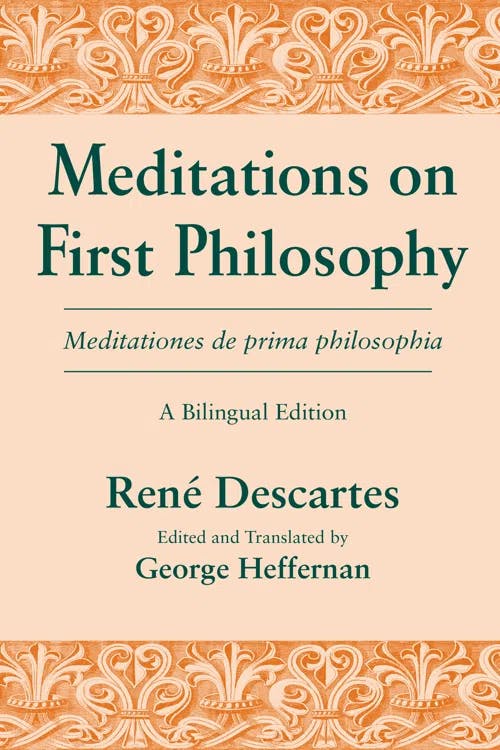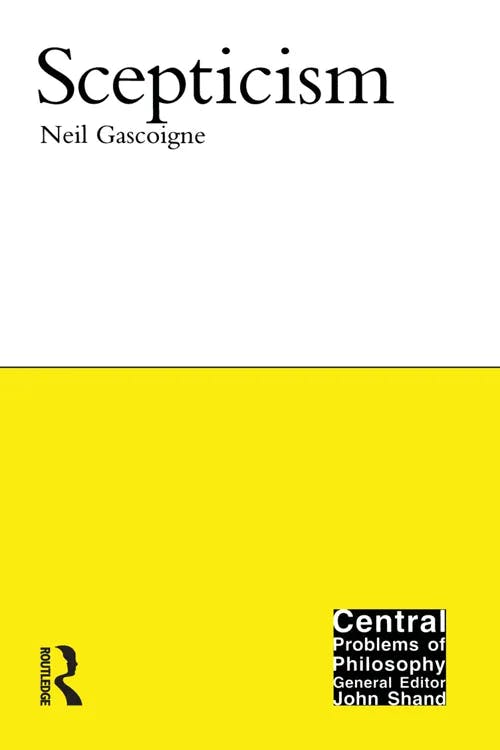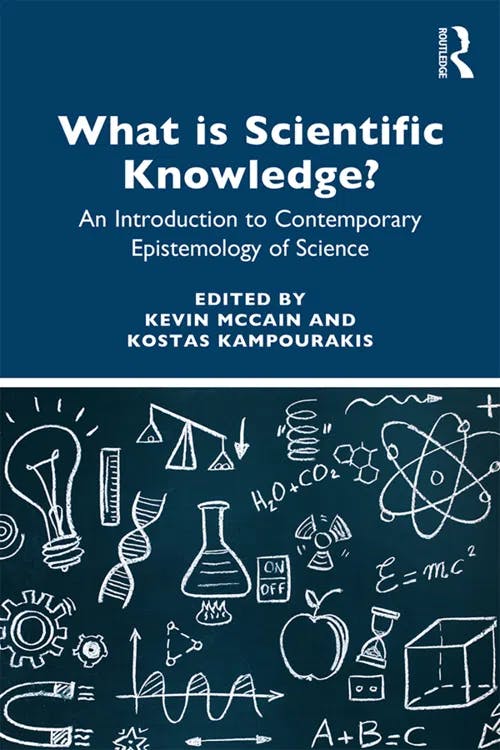What is Epistemology?
MA, English Literature (University College London)
Date Published: 05.10.2023,
Last Updated: 15.02.2024
Share this article
Defining epistemology
Epistemology is a fundamental branch of philosophy, as it is the study of knowledge itself. What is knowledge, how do we attain it, how much of it can we attain, and how can we trust it? How can we be sure that we know anything at all? Epistemology is concerned with all of these questions and more, but the answers are far from straightforward and remain the subject of intense debate. As Robert M. Martin observes,
Philosophers have been thinking about these questions, and arguing with each other about what the answers are, for at least two thousand years. (2014)
Robert M. Martin
Philosophers have been thinking about these questions, and arguing with each other about what the answers are, for at least two thousand years. (2014)
The fact that Martin qualifies his statement with “at least” shows the blurry boundaries of epistemology’s history and development. As the question of knowledge is so fundamental to human experience, epistemology is arguably as old as human thought itself. As a distinct field, however, it is usually traced back to Plato (427–347 BCE) and Aristotle (384–322 BCE). The term itself also has Greek roots, as it is derived from “episteme” (which can be translated as “knowledge”) and “logos” (which can be translated as “study”). While ontology is the study of existence, epistemology is the study of knowledge.
In Philosophy: The Basics (2013), Nigel Warburton lays out some of epistemology’s foundational questions about how we acquire knowledge:
But what is the precise relationship between what I think I see and what is actually in front of me? Can I ever be sure about what is out there? Could I be dreaming? Do objects continue to exist when nobody is observing them? Do I ever have direct experience of the external world?
Nigel Warburton
But what is the precise relationship between what I think I see and what is actually in front of me? Can I ever be sure about what is out there? Could I be dreaming? Do objects continue to exist when nobody is observing them? Do I ever have direct experience of the external world?
Such questions may seem unnecessary, at first. Many of us believe that we can trust our senses, and that we can use empirical observations to make meaningful conclusions about the nature of the world. This, as Warburton continues, is known as “common-sense realism,” but as we will see it’s a view of the world that does not actually “stand up well to skeptical arguments about the reliability of the senses” (2013).
Throughout this guide, we will approach key concepts in epistemology, unpack examples, and take a look at the debates in the field. Multiple avenues for further reading will also be opened up, as epistemology is a rich topic with profound implications for philosophy as a whole as well as other disciplines of study.
Key concepts in epistemology
As it is concerned with the study of knowledge itself, epistemology is unsurprisingly a far-reaching field. Here we will outline just a few of its most significant and influential concepts. For a truly comprehensive engagement with the topic, you can explore the epistemology section of Perlego’s library.
The forms of knowledge
Let’s start with knowledge itself. In our day-to-day lives, the nature of knowledge may not feature too prominently in our thoughts — we may take it for granted that we know it is a Saturday; that we know the sun will rise; and that we know that the local shop will be open from 9am to 5pm. Although this kind of everyday knowledge may seem uncontroversial, each point of knowledge here is a matter of debate in epistemology. In epistemological debates, it is not always clear that we know the things we think we know — or even that we know what it means to “know” anything.
So, what is “knowledge”? Martin identifies the “three main kinds of ways of knowing” in epistemology, “corresponding to three sorts of things said to be known”:
1 Knowledge of facts (for example, Fred knows that the party is cancelled). We’ll call this knowing-that.
2 Knowledge of a thing or person (for example, I know Sally; Irving knows every song the Beatles recorded). We’ll call this knowing-him/her/it.
3 Knowledge [of] how to do something (for example, Zelda knows how to string a guitar). We’ll call this knowing-how.
(2014)
These three main forms of knowledge are also known as propositional knowledge, acquaintance knowledge, and procedural knowledge. As Martin notes, “Almost all the philosophical tradition in epistemology concentrates on knowing-that [propositional knowledge]” (2014).
A priori and a posteriori knowledge
In epistemology, a key distinction is also made between a priori and a posteriori knowledge. These key terms have their origin with Aristotle’s works on logic, collected in The Organon (written c. 4th century BCE).
In a basic sense, a priori knowledge can be understood as knowledge which does not depend on sensory experience. An example of a priori knowledge would be “2 + 2 = 4” — there is no empirical element behind this knowledge; it is not deduced from anything in the material world. Instead, it is an abstract kind of knowledge which deals in pure reason and logic.
As Dan O’Brien explains in An Introduction to the Theory of Knowledge (2016),
I can come to know certain truths just by thinking about the issue in question. I know that there are no triangles with as many sides as a square. I do not have to draw lots of triangles and squares to know that this is so; I simply have to use my powers of reasoning. Such knowledge is called a priori (meaning before experience).
Dan O'Brien
I can come to know certain truths just by thinking about the issue in question. I know that there are no triangles with as many sides as a square. I do not have to draw lots of triangles and squares to know that this is so; I simply have to use my powers of reasoning. Such knowledge is called a priori (meaning before experience).
We know that triangles have three sides just by considering what the definition of a “triangle” is, and so this is an example of a priori knowledge.
A posteriori knowledge, on the other hand, is knowledge which is derived from empirical (sensory) experience. While a priori knowledge is gained before experience, a posteriori knowledge is gained after experience. An example of a posteriori knowledge would be the knowledge statement that “my cat is in the garden.” This knowledge would be gained through the sensory experience of seeing that they are in the garden, not curled up in their bed. O’Brien notes that there are “two sources of such knowledge: it is acquired either through perceiving the world for ourselves [...], or by listening to what others have to say or reading what they have written” (2016).
Philosophers who believe in a priori knowledge can be (roughly speaking) identified as a rationalist, while those who believe that knowledge must instead be gained a posteriori can be identified as an empiricist.
Justified true belief
What does it mean to know something? Is it enough, for example, to simply believe that something is true? Or, in order to constitute knowledge, does our belief need some form of justification? Questions such as these are at the heart of epistemology, with many philosophers holding that a belief needs to be both justified and true in order to be granted the title of “knowledge.” This concept is known as justified true belief (JTB), or the “tripartite analysis or definition of knowledge” (O’Brien, 2016) due to its three constituent components. Justified true belief stands as one of the most influential definitions of knowledge in the history of Western philosophy, and can be traced all the way back to Plato’s dialogues. The following passage in Theaetetus (c. 4th century BCE) is often cited as an example (O’Brien, 2016):
He said that true belief with the addition of an account (logos) was knowledge, while belief without an account was outside its range. (c. 4th century BCE, [2018])
Plato
He said that true belief with the addition of an account (logos) was knowledge, while belief without an account was outside its range. (c. 4th century BCE, [2018])
“Account,” here, can be understood in the sense of “rational justification.” Belief without rational justification, then, is seen as being outside the “range” of knowledge.
It could be asked why this justification aspect is necessary — is it not enough to simply hold a true belief, and call that knowledge? As O’Brien points out, however, “we can have true beliefs by accident. Justification, therefore, is also necessary” (2016). If we hold a belief that just so happens to be true, and we have no justification for believing it, then this would not constitute actual knowledge.
To take an example, let’s consider the following knowledge claim: “this tree is an oak tree.” The underlying justification for this knowledge claim could be unpacked as:
- From my general education, I have learned from trusted, authoritative sources that this is what an oak tree looks like. From examining its leaves and other distinguishing features, I am confident that this particular tree matches the description of an oak tree.
- I have also learned that this is the right climate, environment, and geographical area for an oak tree to be found.
This might seem like a strong form of justification. The majority may be likely to conclude, therefore, that I am right to regard my identification of an oak tree as a form of knowledge. So far then, let’s say that we have a belief that would appear to be justified (although some philosophers would put forward more complicated and rigorous standards for what constitutes justification). In order for this to constitute a justified true belief, however, we still need something else: it needs to be true. If I am somehow mistaken in my identification of the oak tree, no matter how strong I perceive the justification to be, then I do not actually possess knowledge.
A.J. Ayer’s (1910–1989) influential thoughts on justified true belief are interesting to note here:
Ayer thinks that both feeling secure and being entitled to feel secure are necessary. According to him, if you don’t feel secure in a belief, then you don’t know it; and even if you feel secure, if you don’t deserve to feel secure, then you don’t know it. (Martin, 2014)
In other words, Ayer would argue that my identification of the oak tree is only a justified true belief if I objectively deserve to feel secure about it. If I am basing my belief on faulty criteria or reasoning, then this would not be a justified true belief.
The different levels of justification, belief, and truth that should be required for knowledge remain the subject of debate among philosophers — with some holding complete infallibility to be the goal, while others argue for a more forgiving model for reasons of practicality.
Internalism vs. externalism
The question of whether knowledge is internal or external is another key concept in epistemology:
[Internalism] takes the question ‘What is knowledge?’ to be asking what a person has to do to achieve knowledge – what’s going on in me when I’ve got it. [Externalism] takes that question to ask, rather, about what sort of facts about the world (including me) must be the case when I have knowledge. (Martin, 2014)
Robert M. Martin
[Internalism] takes the question ‘What is knowledge?’ to be asking what a person has to do to achieve knowledge – what’s going on in me when I’ve got it. [Externalism] takes that question to ask, rather, about what sort of facts about the world (including me) must be the case when I have knowledge. (Martin, 2014)
The internal vs. external dichotomy, then, is related to where knowledge is seen as being constructed: is it enough to reach knowledge with reference to your internal mental state, or is an external factual basis necessary?
Internalism vs. externalism underpins the issue of knowledge justification that we have explored above. Descartes (1596–1650) and A.J. Ayer are often identified with these two opposing camps: while they both agree on the importance of justification in the formation of knowledge, they disagree over the need for us to be internally aware (in our conscious mind) that this justification exists. As Martin explains,
Descartes (implicitly) and other philosophers (more explicitly) demand that one be aware of the justifying factors for one’s belief, and (perhaps) even that one be aware that they constitute justification. But Ayer’s requirement is weaker: simply that you have sufficient justification, whether you know what this justification is or not. (2014)
Philosophers who agree with Descartes on the question of internal knowledge justification can be said to be internalists, while those who side with Ayer can be said to be externalists. When assessing questions of epistemology, then, it is always important to pay attention to this underlying fault line.
The Gettier problem
Named after Edmund Gettier (1927–2021), the Gettier problem has had a huge impact on the field of epistemology. As Joel Bobbitt explains,
The definition of knowledge as justified true belief was widely accepted until the 1960s. At this time, a paper written by the American philosopher Edmund Gettier provoked major widespread discussion. (2014)
Joel Bobbitt
The definition of knowledge as justified true belief was widely accepted until the 1960s. At this time, a paper written by the American philosopher Edmund Gettier provoked major widespread discussion. (2014)
With Gettier’s intervention, the understanding of knowledge as being justified true belief was no longer sufficient for many philosophers. The Gettier problem, as it has become known, is “that there are situations in which one's belief may be justified and true, yet fail to count as knowledge” (Bobbitt, 2014).
These situations have become known as Gettier cases, with just one example being the following outlined by Duncan Pritchard:
Roddy is a farmer. One day he is looking into a field near-by and clearly sees something that looks just like a sheep. Consequently, he forms a belief that there is a sheep in the field. Moreover, this belief is true, in that there is a sheep in the field in question. But what Roddy is looking at is not a sheep, however, but a big hairy dog that looks just like a sheep and which is obscuring from view the sheep standing just behind. (2016)
Duncan Pritchard
Roddy is a farmer. One day he is looking into a field near-by and clearly sees something that looks just like a sheep. Consequently, he forms a belief that there is a sheep in the field. Moreover, this belief is true, in that there is a sheep in the field in question. But what Roddy is looking at is not a sheep, however, but a big hairy dog that looks just like a sheep and which is obscuring from view the sheep standing just behind. (2016)
By the logic of the Gettier problem, then, the above example would be a case of where someone holds a justified true belief which cannot be said to constitute actual knowledge: although there is a sheep, can the farmer be said to actually know this is the case?
But is the Gettier case convincing? Some philosophers have responded by abandoning the justified true belief model of knowledge, while others have modified it with a series of extra conditions. Others, however, simply reject the idea that Gettier’s problem is a problem for justified true belief at all, as they argue that the beliefs he describes are not actually justified. It could be argued that Gettier works with a low bar of justification, and that the seemingly justified beliefs in his examples may more accurately be described as assumptions founded on limited and imperfect evidence.
Reliabilism is another response to the Gettier problem that has gained traction. Martin explains:
The idea behind reliabilism is simple: a belief is justified when it arises from (or is sustained by) a reliable belief-formation mechanism. A reliable mechanism is one that tends to produce true beliefs. The intention here is to rule out Gettier-type cases in which true belief isn’t knowledge, because it arises just by accident; it’s supposed, then, that a better understanding of justification would show that belief really isn’t justified in those cases. (2014)
Are you convinced by the Gettier problem, or the counter-arguments against it? Is the definition of knowledge being justified true belief sufficient for you? To this day, philosophers are arguing about the answers.
Skepticism
Skepticism can be characterized as a doubting attitude to knowledge claims, and so (as we have seen above) it is baked into the foundation of epistemological debates and ideas. Radical forms of skepticism cut through a lot of the above discussion with the simple premise that we cannot be certain of any knowledge at all. As Neil Gascoigne notes, “scepticism presents epistemology with a theoretical task: to demonstrate that knowledge of the external world is possible” (Scepticism, 2014).
Descartes is one of the most influential philosophers in this area, as he famously engaged in a rigorous questioning of knowledge claims to see if he could be sure of anything — an attitude which has become known as Cartesian doubt. Using the example of a theoretical demon who has the power to deceive us with a false reality, Descartes is troubled by the idea that we cannot actually trust the evidence of our own senses:
I shall think that [...] all external things are nothing other than the playful deceptions of dreams by means of which he [the demon] has set traps for my credulity; I shall consider myself as not having hands, not eyes, not flesh, not blood, not any senses, but rather as falsely opining that I have all these things [...]. (1641, [1990])
René Descartes
I shall think that [...] all external things are nothing other than the playful deceptions of dreams by means of which he [the demon] has set traps for my credulity; I shall consider myself as not having hands, not eyes, not flesh, not blood, not any senses, but rather as falsely opining that I have all these things [...]. (1641, [1990])
Plato’s allegory of the cave and the modern “brain in a vat” thought experiment explore the same idea: what if the “reality” presented to you by your senses is an artificial construct? Radical skepticism casts doubt on our ability to ever know the difference at all. As Gascoigne explains,
the sceptic casts doubt on the possibility of such knowledge by aiming to undermine my confidence in the cognitive status of my perceptual experiences. She points out that I might be dreaming; or perhaps even a disembodied brain, wired up to a supercomputer and floating around in a vat of nutrients. Both of these sceptical possibilities are seemingly consistent with my having exactly the same perceptual experiences as I’m having now, but in neither case would those experiences be reliable guides to what’s really going on in the world. (2014)
Neil Gascoigne
the sceptic casts doubt on the possibility of such knowledge by aiming to undermine my confidence in the cognitive status of my perceptual experiences. She points out that I might be dreaming; or perhaps even a disembodied brain, wired up to a supercomputer and floating around in a vat of nutrients. Both of these sceptical possibilities are seemingly consistent with my having exactly the same perceptual experiences as I’m having now, but in neither case would those experiences be reliable guides to what’s really going on in the world. (2014)
For his own part, Descartes’ famous conclusion is that his doubt, in itself, provides enough evidence for his own existence — “I think, therefore I am” (Discourse on Method, 1637, [2015]). Here, Descartes can be said to be making a rationalist, internalist, a priori knowledge claim. (While solipsism holds that we can only be sure of the existence of our own mind, Descartes does not commit to this view himself.)
Many philosophers disagree with Descartes’ response to skepticism, however, and still regard it as an impassable stumbling block on our road to knowledge. David Hume (1711–1776), for example, argues that we “do not have knowledge of the unobserved” — and “Unlike Descartes, he does not think that his scepticism can be refuted” (O’Brien, 2016). O’Brien continues,
The lesson he takes from this is that we should not concern ourselves with providing a philosophical account of how our empirical thinking can be justified – it cannot; instead, we should pursue the scientific task of providing a causal account of how we have the beliefs that we do. (2016)
This Humean approach is known as mitigated skepticism, as it seeks to redeem the utility of knowledge even if we cannot be sure of it: “we cannot justify our everyday epistemic concepts, only use them” (Gascoigne, 2014). Bayesian epistemology, in a similarly practical way, responds to skepticism by conceiving of knowledge as a spectrum of belief which may or may not be updated as the evidence changes. There is also crossover here with pragmatism, which argues that we should only focus on knowledge’s practical impact.
Closing thoughts
Although the field of epistemology has been around for thousands of years, it is far from ancient history. Thorny questions related to questions of knowledge and the reliability of our senses remain to this day, and these are not just abstract philosophical matters — they are intimately relevant across a range of disciplines with real-world impacts. Epistemology is a live area of study in science, for example. As Kevin McCain and Kostas Kampourakis note in What is Scientific Knowledge? (2019),
scientific knowledge is extremely important to many aspects of our lives from our wellness to our technology and everyday conveniences. Given its importance, it is not surprising that scholars from many disciplines study scientific knowledge and how it is generated.
Edited by Kevin McCain and Kostas Kampourakis
scientific knowledge is extremely important to many aspects of our lives from our wellness to our technology and everyday conveniences. Given its importance, it is not surprising that scholars from many disciplines study scientific knowledge and how it is generated.
One of epistemology’s most pressing areas of relevance is climate change — which, despite the overwhelming evidence of justified scientific knowledge, remains a matter of debate in some quarters. David Coady and Richard Corry, for example, unpack the epistemological question of climate skepticism in The Climate Change Debate: An Epistemic and Ethical Enquiry; arguing that “Skepticism about some topics is justified. Skepticism about other topics is not” (2013).
Although some of the debates we have covered above may be criticized for their tortuous logic and hair-splitting exactitude, epistemology is clearly an endlessly relevant field. It plays a valuable role in expanding our awareness and questioning (or supporting) our underlying assumptions — opening the way for critical thinking in relation to both our own knowledge claims and those of others. It is difficult to overstate the importance of epistemology, as questions of knowledge are central to the human experience and inseparable from our deepest questions. As long as we are interested in knowledge, we will be interested in epistemology.
Further reading on Perlego
- Read our guide on feminist epistemology for insights into how women have been excluded from questions of knowledge production.
- Contemporary Debates in Epistemology (2013), edited by Matthias Steup, John Turri, and Ernest Sosa.
- Our Knowledge of the External World (1914) by Bertrand Russell.
- Contemporary Epistemology: An Anthology (2019), edited by Jeremy Fantl, Matthew McGrath, and Ernest Sosa.
- Hume's Epistemology and Metaphysics (2002) by Georges Dicker.
- Epistemology: The Key Thinkers (2019), edited by Stephen Hetherington.
What is epistemology in simple terms?
Which philosophers are associated with epistemology?
What are the best books on epistemology?
Bibliography
Aristotle (2015) The Organon. Jazzybee Verlag. Available at: https://www.perlego.com/book/1071920/the-organon-pdf
Audi, R. (2010) Epistemology. 3rd edn. Taylor and Francis. Available at: https://www.perlego.com/book/1510187/epistemology-a-contemporary-introduction-to-the-theory-of-knowledge-pdf
Bobbitt, J. (2014) Epistemology. World Technologies. Available at: https://www.perlego.com/book/1239014/epistemology-significant-branch-of-philosophy-concepts-and-theories-pdf
Coady, D. and Corry, R. (2013) The Climate Change Debate: An Epistemic and Ethical Enquiry. Palgrave Macmillan UK. Available at: https://www.perlego.com/book/3486302/the-climate-change-debate-an-epistemic-and-ethical-enquiry-pdf
Descartes, R. (1990) Meditations on First Philosophy. University of Notre Dame Press. Available at: https://www.perlego.com/book/856235/meditations-on-first-philosophy-meditationes-de-prima-philosophia-a-bilingual-edition-pdf
Descartes, R. (2015) Discourse on Method. Philosophical Library/Open Road. Available at: https://www.perlego.com/book/2428537/discourse-on-method-pdf
Gascoigne, N. (2014) Scepticism. Taylor and Francis. Available at: https://www.perlego.com/book/1558024/scepticism-pdf
Lin, H. (2022) "Bayesian Epistemology", The Stanford Encyclopedia of Philosophy. Fall 2022 Edition. Available at: https://plato.stanford.edu/archives/fall2022/entries/epistemology-bayesian/
Martin, R. (2014) Epistemology: A Beginner’s Guide. Oneworld Publications. Available at: https://www.perlego.com/book/950375/epistemology-a-beginners-guide-pdf
McCain, K. and Kampourakis, K. (eds.) (2019) What is Scientific Knowledge? Taylor and Francis. Available at: https://www.perlego.com/book/1612446/what-is-scientific-knowledge-an-introduction-to-contemporary-epistemology-of-science-pdf
O’Brien, D. (2016) An Introduction to the Theory of Knowledge. 2nd edn. Polity Press. Available at: https://www.perlego.com/book/1536321/an-introduction-to-the-theory-of-knowledge-pdf
Plato (2018) Theaetetus. Dover Publications. Available at: https://www.perlego.com/book/823645/theaetetus-pdf
Pritchard, D. (2016) Epistemology. 2nd edn. Palgrave Macmillan UK. Available at: https://www.perlego.com/book/3507443/epistemology-pdf
Steup, M. and Neta, R. (2020) "Epistemology", The Stanford Encyclopedia of Philosophy. Fall 2020 Edition. Available at: https://plato.stanford.edu/archives/fall2020/entries/epistemology/
Turri, J. (2013) Epistemology. Wiley. Available at: https://www.perlego.com/book/997015/epistemology-a-guide-pdf
Warburton, N. (2013) Philosophy: The Basics. 5th edn. Taylor and Francis. Available at: https://www.perlego.com/book/1508905/philosophy-the-basics-pdf
MA, English Literature (University College London)
Andy Cain has an MA in English Literature from University College London, and a BA in English and Creative Writing from Royal Holloway, University of London. His particular research interests include science fiction, fantasy, and the philosophy of art. For his MA dissertation, he explored the presence of the sublime in Shakespeare’s plays.

